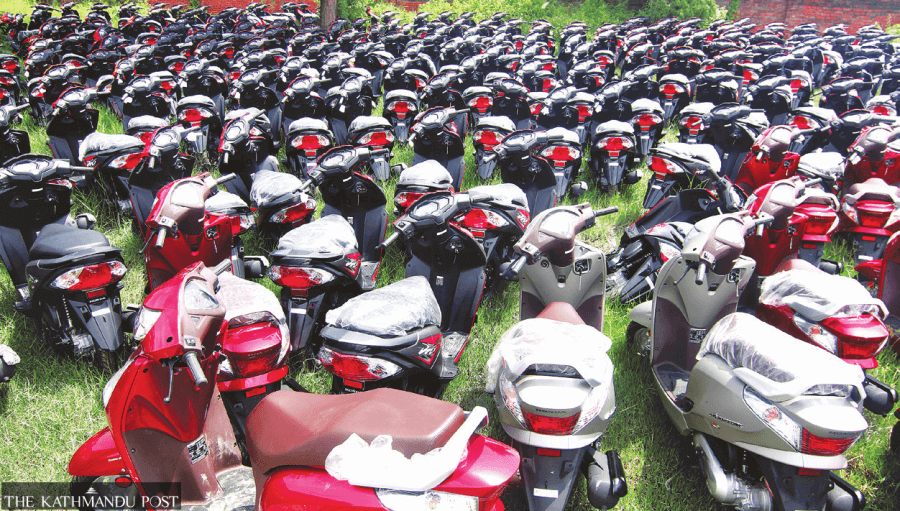
The government has decided to slash customs duty on low-end motorcycles. Post File Photo
The government has decided to slash customs duty on sanitary pads and low-end motorcycles in a bid to make them cheaper and affordable to a larger section of the population.
Both petrol-powered and electric four-wheelers, high-end motorcycles, alcohol and tobacco products will become pricier due to higher taxes, as per the Finance Bill presented along with the budget statement for fiscal year 2022-23 on Sunday.
The import duty on sanitary pads will be cut by 90 percent in response to a growing outcry against what has been called period tax.
Last year, protests erupted following reports that the import duty on sanitary pads, which are essential for menstrual hygiene of women and girls, had been hiked by the then KP Sharma Oli administration. The government responded that no such thing had been done, but the demonstrations helped to rally public support against the tax.
The ruling Nepali Congress government had stated in its election manifesto that sanitary towels would be provided free of cost.
Currently, the government imposes 15 percent customs duty and 13 percent value added tax on sanitary pads. Presenting the budget statement to Parliament, Finance Minister Janardan Sharma said the taxes would be reduced.
The import duty on raw materials for producing sanitary pads will be brought down to 1 percent, which will make them cheaper and more accessible.
The government also announced that the excise and customs duties on raw materials and parts for manufacturing four-wheelers would be cut by 50 percent and 25 percent, respectively.
Customs duty of only 1 percent will be levied on parts and raw materials used in manufacturing electric three-wheelers and two-wheelers in a bid to promote domestic production of electric vehicles.
But the government has decided to levy excise duty on top of the existing customs duty on high performance electric vehicles which will make them more expensive, insiders say. Previously, excise duty was not levied on electric vehicles.
According to the Finance Bill, the government has decided to charge 30 percent excise duty on vehicles fitted with 100-200 kW motors.
The government will impose 45 percent excise duty on the import of electric vehicles equipped with motors of 201-300 kW capacity. Excise duty has been maintained at 60 percent on electric vehicles with a motor capacity of more than 300 kW.
In 2020, when the Oli-led government increased taxes on electric vehicles, there were protests arguing that the move was against the government’s own policy of promoting electric vehicles in the country.
The government had hiked excise duty on e-vehicles in the range of 30-80 percent depending on their capacity, and levied customs duty of 60 percent. It later reversed the decision.
Though the government has banned the import of automobiles till the end of current fiscal year 2021-22, it has either hiked or reduced duties on different types of vehicles.
The government has increased excise duty on micro buses with a capacity of 11-14 seats to 55 percent from 40 percent which will make them dearer.
The excise duty on cars with a capacity of 1,500 cc to 2,000 cc has been increased from 70 percent to 75 percent. The duty on 2,000-2,500 cc cars has been increased from 80 percent to 85 percent.
The excise duty on automobiles with an engine capacity of more than 3000 cc has been raised by 5 percent to 105 percent, according to the Finance Bill.
The government has hiked the excise duty on high-end two-wheelers with a capacity of more than 200 cc. The excise duty on motorcycles with a capacity of 125 cc to 200 cc has been reduced from 50 percent to 40 percent.
The excise duty on motorcycles with a capacity of 200 cc to 250 cc will be charged at the rate of 80 percent, up from 60 percent earlier. The excise duty on motorcycles with a capacity over 250 cc has also been hiked.
The excise duty on billet, a semi-product made through melting steel scrap, has been increased to Rs3,500 per tonne from Rs2,500 per tonne. Last September, when the excise duty was raised to Rs2,500 from Rs1,650 through a replacement bill, there were charges that the decision had been taken in the interest of certain groups.
The government has also hiked the excise duty on steel pins from Rs2,500 per tonne to Rs10,000 per tonne.
The excise duty on sponge iron, which is needed to produce billets, has been eliminated. Billet, used to manufacture iron and steel, is one of the largest import items of the country.
A hike in the excise duty on billet will affect the country's iron and steel industry, which depends on imported billets, insiders said.
Finance Minister Sharma has got tough on alcohol consumption. He has increased the excise duty on beer to Rs228 per litre from Rs198 per litre. The excise duty on beer without alcohol has been hiked to Rs30 per litre from Rs20 per litre.
The excise duty on whisky with alcohol up to 48.5 percent has been increased to a minimum of Rs1,750 per litre from Rs1,592 per litre. The maximum excise duty in this category of whisky has also been increased to Rs2,059 per litre from Rs1,872 per litre.
The excise duty on whisky with 42.8 percent alcohol has been increased to a minimum of Rs1,306 per litre from Rs1,188 per litre. The maximum duty has been hiked to Rs1,741 from Rs1,584 per litre.
The excise duty on whisky with 39.94 percent alcohol has been increased to a minimum of Rs1,215 per litre from Rs1,105 per litre earlier. The maximum rate has been increased to Rs1,735 per litre from Rs1,578 per litre.
The prices of tobacco products are set to rise as the excise duty has been increased.













